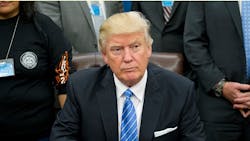China Signals Retaliation After Trump's Call for Trade Review
U.S. President Donald Trump’s request to probe how China handles intellectual property prompted a firm response: Beijing will stand up for its rights.
The Ministry of Commerce responded with a statement Tuesday expressing serious concern and saying it "will resort to all proper measures" to firmly defend its lawful rights if the U.S. disregards multilateral rules and hurts bilateral trade ties.
"The U.S. should cherish the current good trade ties and rapport with China, and any protectionist move will certainly damage bilateral economic relations and hurt the business interests of companies in both countries," the ministry said in its statement.
IP Practices Under Scrutiny
The memo Trump signed Monday adds to the list of trade irritants between the world’s two biggest economies as they work to contain North Korea. It directs U.S. Trade Representative Robert Lighthizer to consider investigating China’s intellectual property policies, especially the practice of forcing U.S. companies operating there to transfer technological know-how.
If China is found to be flouting the rules on U.S. intellectual property, the administration has a range of options, including imposing import tariffs, according to administration officials, who spoke to reporters Saturday on the condition of anonymity. If USTR moves forward, the investigation could take as long as a year.
“It’s my duty and responsibility to protect the American workers’ technology and industry from unfair and abusive actions,” Trump said at the White House. “We will stand up to any country that unlawfully forces American companies to transfer their valuable technology as a condition of market access. We will combat the counterfeiting and piracy that destroys American jobs.”
The review will be one of USTR’s highest priorities and it will act if needed “to preserve the future of U.S. industry,” Lighthizer said in a statement. “China industrial policies and other practices reportedly have forced the transfer of vital U.S. technology to Chinese companies.”
The outcome of the order is more likely to be benign and not yield punitive action rather than seriously escalate trade tensions and lead to trade war, according to Liu Li-gang, chief China economist at Citigroup Inc. in Hong Kong. It could satisfy demands of some U.S. interest groups and also fulfill Trump’s campaign pledges, Lui wrote in a report Tuesday.
Trump beginning the process of potentially starting an investigation is similar to a 2010 Obama administration probe that ended with a negotiated settlement with the Chinese government, according to Jacob Parker, a vice president at the U.S.-China Business Council in Beijing. That exchange didn’t lead to any unilateral U.S. action or affect bilateral economic relations, he said Tuesday in a Bloomberg Television interview.
‘Irritant Effect’
"It’s premature now to say whether or not this will have a long-term irritant effect on the Chinese-U.S. trade relationship," Parker said. Both economies benefit from positive trade relations, and "any kind of trade war, tit-for-tat exchange, would negatively impact both countries, they would also negatively impact the U.S. consumer and manufacturer."
Meanwhile, the top Democrat in the Senate said the president hasn’t yet matched his tough talk on China with action. “To make an announcement that they’re going to decide whether to have an investigation on China’s well-documented theft of our intellectual property is another signal to China that it is OK to keep stealing,” Senate Minority Leader Chuck Schumer said in a statement.
Chinese state media on Monday criticized Trump’s plans for an IP probe, saying the action will do more harm than good, whether it’s a new policy approach or negotiating tactic.
The move comes amid growing tension over the threat of North Korea using nuclear weapons, and less than two weeks after the U.S. received China’s help in the United Nations Security Council to impose tougher economic sanctions on Pyongyang.
Calm Nerves
Chinese President Xi Jinping moved to calm nerves last week, telling the U.S. president during a phone call that all sides should maintain restraint and avoid inflammatory comments. While the White House said the leaders reaffirmed their commitment to rid the Korean peninsula of nuclear weapons, Trump has previously criticized China for not reining in North Korea, and threatened trade measures if Xi fails to act.
Trump’s announcement further complicates the already taut U.S.-China relationship, which took a frosty turn last month when officials from both nations couldn’t agree on a joint statement over economic issues after high-level talks in Washington.
Still, Trump’s actions stop short of what some analysts had been expecting him to do on intellectual property. Rather than launching straight into a probe, USTR will first consider whether to begin an investigation under Section 301 of the 1974 Trade Act. That law allows the president to impose tariffs on foreign products in response to unfair or discriminatory restrictions on American commerce. The 301 provision has practically fallen into disuse since the mid-1990s after the creation of the World Trade Organization.
Decision Timeline
Administration officials on Saturday declined to say how long it will take before a decision is made whether to start a probe.
In a USTR report to lawmakers that was released in July, the administration accused China of engaging in “widespread infringing activity, including trade secret theft, rampant online piracy and counterfeiting, and high levels of physical pirated and counterfeit exports to markets around the globe.”
Earlier this year, a commission on U.S. intellectual property estimated that the annual cost to the U.S. economy in counterfeit goods, pirated software, and theft of trade secrets from all sources exceeds $225 billion and could be as high as $600 billion. China is the world’s principal IP infringer, the commission said.
USTR argues Beijing uses a range of practices to force U.S. companies to transfer IP, such as by granting regulatory approvals to drug makers that shift production to China or requiring that the designs of foreign products be replicable in China.
By Andrew Mayeda
About the Author
Bloomberg
Licensed content from Bloomberg, copyright 2016.
